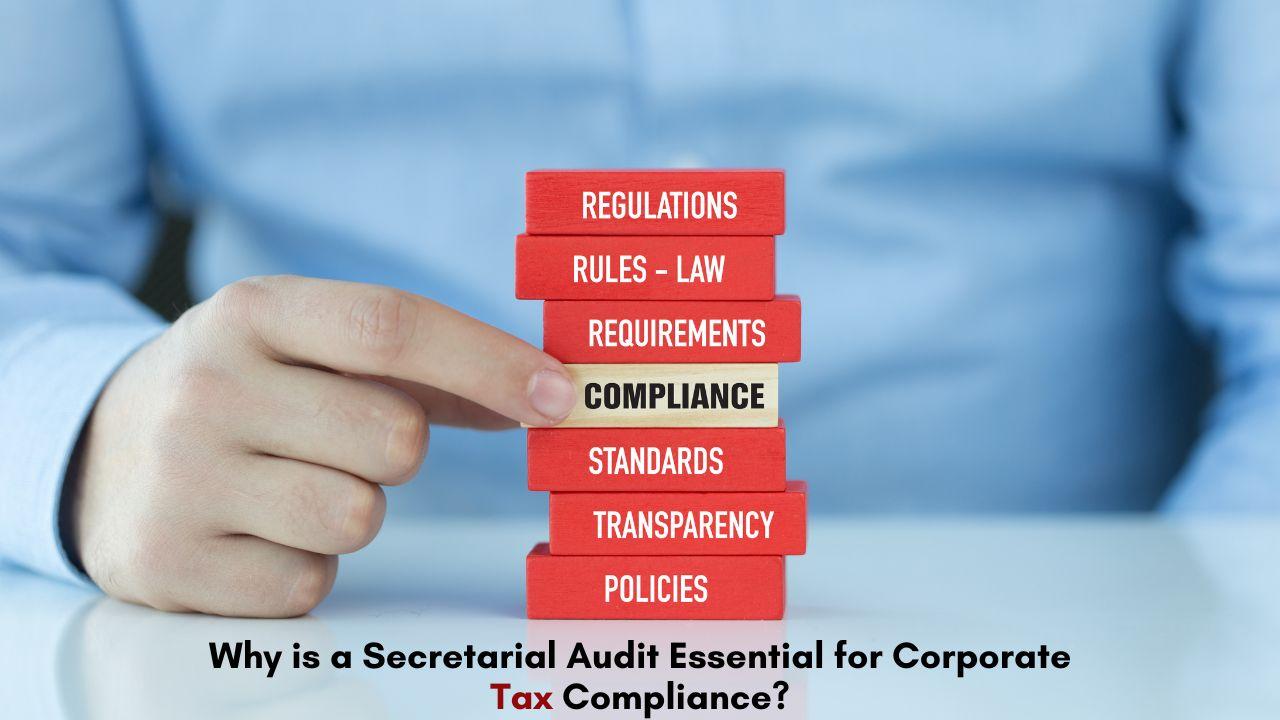Introduction
Corporate tax compliance is a critical aspect of business operations, ensuring that companies adhere to legal and regulatory requirements. One effective way to maintain compliance is through a secretarial audit, a process that examines a company’s adherence to corporate laws, governance norms, and compliance regulations. A thorough audit not only mitigates legal risks but also strengthens a company’s financial standing and reputation.
Understanding Secretarial Audit and Its Role in Corporate Compliance
A secretarial audit is a comprehensive review of a company’s legal and procedural compliance. Conducted by a qualified company secretary, it ensures that businesses follow corporate regulations under the Companies Act, SEBI regulations, and other applicable laws. Unlike financial audits, which focus on financial records, a secretarial audit examines governance frameworks, board resolutions, regulatory filings, and tax compliance.
Ensuring adherence to statutory requirements prevents penalties and legal disputes. Additionally, it promotes transparency and enhances investor confidence by demonstrating that a company follows best governance practices.
Secretarial Audit in Company Law and Its Impact on Tax Compliance
Corporate laws mandate businesses to comply with numerous statutory requirements. The secretarial audit in company law acts as a safeguard against non-compliance by identifying gaps in regulatory filings and corporate governance. A well-executed audit covers aspects such as board meeting procedures, shareholder resolutions, regulatory approvals, and tax obligations.
By aligning corporate actions with legal requirements, companies reduce tax-related risks and avoid unnecessary financial burdens. Proper documentation and timely regulatory submissions ensure compliance with tax authorities, preventing disputes and penalties.
The Importance of Due Diligence in Tax Compliance
Ensuring corporate tax compliance goes beyond basic filings; it requires a thorough due diligence process. This involves examining a company’s financial transactions, contracts, corporate filings, and governance policies to identify potential risks.
The process of due diligence helps companies assess their tax liabilities, verify compliance records, and rectify discrepancies before they escalate into legal challenges. Proper documentation and record-keeping, verified through due diligence, serve as strong evidence of compliance during tax audits.
Secretarial audits play a crucial role in this process by verifying that all necessary corporate documents, such as tax returns, board resolutions, and regulatory filings, are accurate and up to date. A well-maintained compliance framework enhances the credibility of a company in the eyes of investors, regulatory authorities, and financial institutions.
How Virtual CFO Services Strengthen Tax Compliance
Businesses often struggle to navigate the complexities of tax compliance without expert guidance. This is where Virtual CFO Services offer significant value. A Virtual CFO provides financial expertise, ensuring that a company’s financial records, tax filings, and compliance frameworks are well-structured and error-free.
By integrating secretarial audits with financial oversight, Virtual CFOs help businesses proactively address compliance challenges. They assist in tax planning, risk assessment, and regulatory reporting, ensuring that companies adhere to statutory requirements without last-minute surprises.
The Role of a Virtual CFO for Business Startups in Secretarial Audits
Startups, in particular, face unique tax and compliance challenges due to their evolving structures and rapid growth. A virtual CFO for business startups provides critical support by guiding them through tax regulations, corporate governance requirements, and financial planning.
Startups often lack in-house expertise to handle complex regulatory frameworks. A Virtual CFO ensures that secretarial audits are conducted efficiently, helping new businesses maintain compliance from the outset. This proactive approach minimizes the risk of tax penalties and regulatory complications, allowing startups to focus on business expansion.
Benefits of Conducting a Secretarial Audit for Tax Compliance
A well-implemented secretarial audit offers multiple advantages for corporate tax compliance:
- Risk Mitigation: Identifies compliance gaps and prevents legal penalties.
- Financial Accuracy: Ensures proper record-keeping and regulatory filings.
- Enhanced Governance: Strengthens corporate structure and internal controls.
- Regulatory Confidence: Demonstrates adherence to legal norms, improving investor trust.
- Strategic Planning: Helps businesses align tax obligations with financial strategies.
At Corpbiz, we understand the complexities of corporate tax compliance and governance. Our expert team offers end-to-end secretarial audit services, ensuring that businesses meet legal requirements without hassle. From conducting thorough due diligence to assisting with financial planning through Virtual CFO Services, we help companies streamline compliance and mitigate risks. Whether you’re a startup or an established enterprise, Corpbiz provides tailored solutions to keep your business on track.
Conclusion
A secretarial audit is not just a regulatory requirement; it is a strategic tool for ensuring corporate tax compliance. By integrating due diligence, expert financial oversight, and governance best practices, businesses can avoid legal pitfalls and maintain a strong financial standing. Whether through Virtual CFO Services or structured compliance frameworks, companies that prioritize secretarial audits safeguard their long-term growth and stability.



